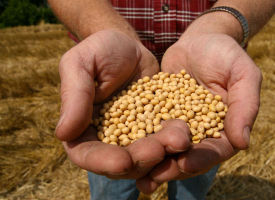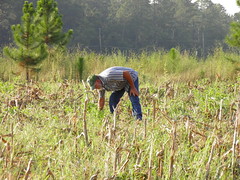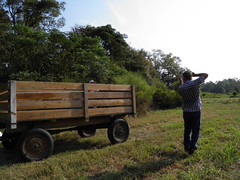 She told me not to video her:
She told me not to video her:
But did I listen?
Video by John S. Quarterman of Gretchen Quarterman demonstrating preserving at a south Georgia event in Tifton by Georgia Organics, 13 Nov 2010.
-jsq
I remember that!As recently as late December, Monsanto was named “company of the year” by Forbes magazine. Last week, the company earned a different accolade from Jim Cramer, the television stock market commentator. “This may be the worst stock of 2010,” he proclaimed.
 The month after Forbes did that,
Covalence did a survey that ranked Monsanto
the least ethical company in the world.
Worse than Philip Morris, Chevron, or Halliburton!
The month after Forbes did that,
Covalence did a survey that ranked Monsanto
the least ethical company in the world.
Worse than Philip Morris, Chevron, or Halliburton!
About that time we discovered Monsanto Corn Causes Liver and Kidney Damage in Rats, and that Monsanto’s GM soy causes sterility and five times higher infant mortality in hamsters.
Meanwhile, the
U.S. Department of Justice was
investigating Monsanto’s seed business. At least
seven U.S. states started their own
investigations, and later the U.S. EPA fined
Monsanto $2.5 million for selling seeds illegally in Texas counties where
they were banned.
Anyway, could all this bad news have some effect on Monsanto’s share price?
Continue reading  Since then we’ve learned that
Pesticides Linked to ADHD.
Specifically organophosphate pesticides.
Like Glysophate (RoundUp).
And that indicators of pesticides, including organophosphates,
are found in the urine of 95% of school children.
We already knew that
Glysophoate causes birth defects in humans.
Since then we’ve learned that
Pesticides Linked to ADHD.
Specifically organophosphate pesticides.
Like Glysophate (RoundUp).
And that indicators of pesticides, including organophosphates,
are found in the urine of 95% of school children.
We already knew that
Glysophoate causes birth defects in humans.
Mutant pigweed, Amaranthus palmeri, caused by repeated application of Roundup to cotton. Pictures by Gretchen Quarterman, Coffee County, Georgia, 2 October 2010. More in the flickr set.
The first economic analysis of growing genetically modified crops on a wide scale has found that the biggest winners were the farmers who decided not to grow them.The article then tries to say they nonetheless benefited from genetic modification:The study, which looked at maize yields in the corn belt of the United States, found that farmers who continued to grow conventional crops actually earned more money over a 14-year period than those who cultivated GM varieties.
All farmers benefited from the significantly lower level of pests that came about after the introduction of GM maize to the US in 1996, but the conventional farmers who continued to cultivate non-GM varieties also benefited financially from not having to pay the extra costs of purchasing GM seeds.Um, what about not having to pay for the pesticides that go with the GM seeds? The study’s author admits they didn’t study that sort of thing:
The Telegraph spelled his name wrong. This appears to be the actual report:“Additionally, environmental benefits from corn borer suppression are likely occurring, such as less insecticide use, but these benefits have yet to be documented,” Dr Hutchinson said.
Areawide Suppression of European Corn Borer with Bt Maize Reaps Savings to Non-Bt Maize GrowersThe full text is behind a paywall, but the abstract concludes with:
W. D. Hutchison, E. C. Burkness, P. D. Mitchell, R. D. Moon, T. W. Leslie, S. J. Fleischer, M. Abrahamson, K. L. Hamilton, K. L. Steffey, M. E. Gray, R. L. Hellmich, L. V. Kaster, T. E. Hunt, R. J. Wright, K. Pecinovsky, T. L. Rabaey, B. R. Flood, and E. S. Raun (8 October 2010)
Science 330 (6001), 222. [DOI: 10.1126/science.1190242]
…and highlight economic incentives for growers to maintain non-Bt maize refugia for sustainable insect resistance management.So growing 98% of crops from GM seeds, as is the case in Georgia, is a bad idea.
 Who’s that in the field?
Why it’s that Terry Davis,
collecting corn ears that his combine missed!
Who’s that in the field?
Why it’s that Terry Davis,
collecting corn ears that his combine missed!
 Some assembly required for the trailer.
Some assembly required for the trailer.
 Here’s what we want to pick: ears of corn on standing stalks.
Here’s what we want to pick: ears of corn on standing stalks.
Here we go: Continue reading
 Jeremy Scahill write in the Nation about
Blackwater’s Black Ops:
Jeremy Scahill write in the Nation about
Blackwater’s Black Ops:
Blackwater, through Total Intelligence, sought to become the “intel arm” of Monsanto, offering to provide operatives to infiltrate activist groups organizing against the multinational biotech firm.What’s the connection between Total Intelligence Solutions and Blackwater, the company famous for its activities as a military contractor in Iraq, and now known as Xe? According to the story, both are owned by Blackwater’s founder, Eric Prince, pictured to the right.
-jsq
García is the large man sitting in front of the flag. The Monsanto rep. is the short man sitting to García’s left.
It’s not clear when this meeting took place, but it may have been the one referred to in this 11 Oct 2007 story, which says: Continue reading
 Sarah Uttech writes that
Cover crops reduce erosion, runoff:
Sarah Uttech writes that
Cover crops reduce erosion, runoff:
Cover crops may be more effective at reducing soil erosion and runoff after maize harvest than rough tillage, according to scientists from the Université Catholique de Louvain, in collaboration with the Independent Center for the Promotion of Forage (CIPF).This study was done in Belgium, but Tifton A soil we have around here is a sandy loamy soil. And as we know from research done in Georgia, around here we also need to manage the mutant pigweed, and for that a combination of plowing and winter cover crops works best.The three-year study, supervised by Charles Bielders and conducted by Eric Laloy, measured erosion and runoff losses from silt loam and sandy loam soils in continuous silage maize cropping. The research revealed that cover crops reduced erosion by more than 94% compared to bare soil during the intercropping period. Cover crops and reduced tillage appeared equally effective in reducing runoff and soil loss between cropping cycles, despite the fact that the cover crop development was very poor.
The results were reported in the May/June 2010 edition of the Journal of Environmental Quality, a publication of the American Society of Agronomy, Crop Science Society of America, and Soil Science Society of America.
-jsq
Pour pesticides on crops until they breed more mutant superweeds.
So what is our old friend 2,4-D, which used to be commonly used back in the 1980s? Continue reading
About pigweed, Georgia Extension weed scientist Dr. Stanley Culpepper says:
Economic survival will depend on managing the seedbank!!!!That’s on page 30 of a 46 page presentation at the 2010 Beltwide – Consultants Conference, after discussing how rapidly Roundup-Ready seeds have been adopted:
And how the value of advice on weed control during that period rapidly decreased as a direct correlation: Continue reading